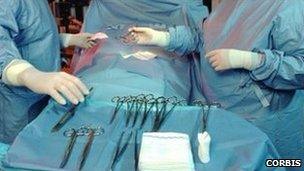Presumed consent plan: Wales supplies more organ donors
- Published

Wales and the rest of the UK still fall behind other European countries on organ donation
A call has been made for more research into presumed consent for organ donation as Wales is poised to become the first part of the UK to adopt it.
A University of Ulster team has found Wales consistently supplies more donors and donations than other UK nations.
But they say that laws on presumed consent across Europe show mixed results and need further research.
Presumed consent campaigners say they have raised awareness of the issue, but opponents warn that it could backfire.
The Ulster team analysed data from NHS Blood & Transplant for all four UK countries between 1990 to 2009, and compared data on registration and donation from other European countries.
The research found, external that Wales "consistently outperformed" its UK neighbours, both in terms of the percentage of people registered and its organ donation rate, which had been higher than the UK average for most of the past 20 years.
The authors recommended more research on the issue of presumed consent, which would mean people would have to opt out of becoming donor, or their organs may be used.
The Welsh government is proposing to introduce the system, external with a proviso that family members should be consulted.
The idea has the support of bodies like the Kidney Wales Foundation, but it has been criticised by some, such as the Archbishop of Wales, Barry Morgan, who said organs should be donated as a gift and not as an "asset of the state."
Spain was found to have doubled organ donation rates with a such a system of "soft" presumed consent, but Sweden - which presumes consent - had a similar rate to Germany and Denmark where informed consent operates, as in the UK.
"Further exploration of underlying regional differences and temporal variations in organ donation, as well as organisational issues, practices and attitudes that may affect organ donation, needs to be undertaken before considering legislation to admit presumed consent," the report says.
"Comparison of EU nations, and particularly Spain, indicates that improvement of organ donation rates is unlikely to be achieved by introducing new legislation alone."
'Better awareness'
Swansea GP Dai Lloyd, who first tried to introduce a law on presumed consent when he was a member of the Welsh assembly, welcomed the findings.
"It's testament to the debates we've been having over the last few years with well-funded campaigns by the Welsh government and Kidney Wales," he said.
"It's gone some way to promoting better awareness of organ donation."
Roy Thomas, chairman of the Kidney Wales Foundation, said there was still a long way to go to catch up with other European countries.
"We're still getting 30% (of people registering as donors) - we want to see a doubling of that.
"The register is old-fashioned and out of date ... other countries have donation rates far better than ours."
But David Webb, a renal consultant who recently retired from the Princess of Wales Hospital, Bridgend, claimed that legislation introducing presumed consent could "upset the apple cart".
He believed close-knit communities responded well to appeals, but could react badly to compulsion.
"Wales has done very well on a voluntary basis but there's a lot of resentment to the idea of the state taking people's organs," he said.
"The bottom line is that the rate of transplants should improve - anything that obstructs that is ill-advised."
In 2008 a UK government taskforce rejected the idea of presumed consent saying it may not increase the number of donors but could prove costly.
- Published21 September 2011
- Published18 September 2011
- Published28 June 2011
- Published30 March 2011